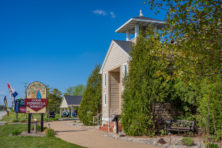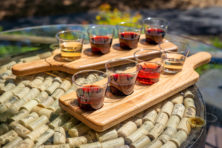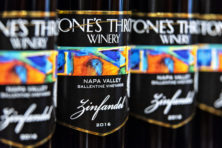Wine Trails: Anchored Roots Winery is Rooted in Agriculture
- Share
- Tweet
- Pin
- Share

When you enter Anchored Roots Winery in Egg Harbor, you know at once that you’ve walked into a family-owned, family-run operation. I was meeting with Amy Gale, who runs the business end of the winery, and her husband, Eric, who makes the wine and manages the vineyard.
“Eric is vine to bottle, and I’m bottle to glass,” she said.
We are joined by Henry, age 2½, who is splitting his time between the toys found throughout the tasting room and Simon, age 7 months, who is splitting his time between Eric’s and Amy’s arms. It’s early morning on what will be a busy Saturday, so Eric’s dad, Dave, will be arriving soon to help Eric crush the grapes, and Amy’s mom, Nancy, will be coming before the tasting room opens to watch Henry and Simon, allowing Amy to manage the tasting room and kitchen.
I wanted to talk about the wines offered at Anchored Roots, but Eric reminded me that to understand wine, you must start in the vineyard. He earned his advanced degree in viticulture from Washington State University and explained the process of winemaking from a synergistic perspective by describing the relationships among the soil, vine, climate, grape, juice, yeast and a multitude of other factors that determine the characteristics of a wine.
Anchored Roots is a winery, but Eric insists that it’s first a farm and quotes Aldo Leopold, the renowned Wisconsin naturalist: “There are two spiritual dangers in not owning a farm. One is the danger of supposing that breakfast comes from the grocery store, and the other that heat comes from the furnace.”
Amy grew up in Milwaukee, while Eric was raised in Luxemburg and worked on a neighbor’s dairy farm. That’s where his love affair with agriculture began. His love affair with Amy started when they met at St. Norbert College. After graduation, they moved to Washington State. There, Eric continued his education and gained his grape-growing and winemaking experience, and Amy learned the business side of selling wine, running tasting rooms for one of the wineries in the region. Vine to bottle, and bottle to glass. They built relationships with many of the vintners, vineyards and wineries, and those relationships form the foundation of their grape sourcing for their Washington wines.

Eric discussed the challenges of growing and sourcing grapes from the peninsula. Wisconsin’s cold-climate grapes tend to be highly aromatic and acidic, so the challenge, he explained, is to take full advantage of those aromatics and balance the acidity.
Solid viticultural practices and proper sourcing play a key role. After all, Eric believes that making wine is rooted in agriculture. But most of the process takes place in the winery through balancing the acidity and residual sugar and through blending the wines to reflect the style he wants to achieve. Creating balance is key to quality wine.
He’s excited about working with the newly developed cold-climate varieties, saying that the best cabernet and cabernet-merlot blend have already been created, but the finest Petite Pearl or cold-climate blend has not – or not yet, anyway.
The Gales believe that superior grapes from quality Washington State growers will always be represented in their portfolio, but estate wines and ones produced from Wisconsin grapes will be equally important.
Eric is confident that continued research at both the industry and individual winery level, sound viticultural and enological practices, and a little creativity and experimentation will lead to Door County wines that reflect their terroir, garner respect from serious wine drinkers and, most importantly, bring pleasure to those who give them a chance.
The Gales are optimistic that Door County has the potential to be recognized as a serious wine region. A strong connection to agriculture, and respect for the land, soil and vine will be key to quality wine because, as Eric affirmed, it all starts on the farm.
Jim Schnaedter describes himself as a wine appreciator, but not an expert. “I love drinking it, pouring it, talking about it and writing about it, but the more I do of each, the more I learn what I don’t know about it.” He sets out to discover more about Door County wines and their makers in this series.





